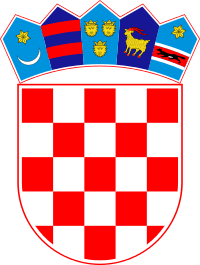Judiciary of Croatia

The judiciary of Croatia is a branch of the Government of Croatia that interprets and applies the laws of Croatia, to ensure equal justice under law, and to provide a mechanism for dispute resolution. The legal system of Croatia is a civil law system, historically influenced by Austrian, Hungarian and Yugoslav law,[1] but during the accession of Croatia to the European Union, the legal system was almost completely harmonised with European Union law. The Constitution of Croatia provides for an independent judiciary, led by a Supreme Court[2] and a Constitutional Court.[3]
Structure
The judiciary is a three-tiered system of courts, at the highest tier of which is the Supreme Court which is the highest court of appeal. Judges are appointed by the National Judicial Council and hold office until the age of seventy. The president of the Supreme Court is appointed for a four-year term by the Croatian Parliament, on the advice of the President of the Republic.[4] The lower two levels of the judiciary consist of 21 county courts and 67 municipal courts, as well as misdemeanour, commercial and administrative courts.[4][5]
Constitutional Court
The Constitutional Court rules on matters regarding compliance of legislation with the constitution, repeals unconstitutional legislation, reports any breaches of provisions of the constitution to the government and the parliament, declares the speaker of the parliament acting president upon petition from the government in the event the country's president becomes incapacitated, issues consent for commencement of criminal procedures against or arrest of the president, and hears appeals against decisions of the National Judicial Council.[3] The court consists of thirteen judges elected by members of the parliament for an eight-year term. The president of the Constitutional Court is elected by the court judges for a four-year term.[6]
National Judicial Council
The National Judicial Council consists of eleven members, specifically seven judges, two university professors of law and two members of parliament, nominated and elected by the Parliament for four-year terms, and serving no more than two terms.[7][8] It appoints all judges and court presidents, except for the Supreme Court.
State Attorneys
The State Attorney's Office represents the state in legal procedures. The office is led by the General State Attorney, assisted by twenty-three deputies in the central office and lower-ranking State Attorneys at fifteen county and thirty-three municipal State Attorney's Offices.[9][10] The General State Attorney is appointed by Parliament.[11][12] A special State Attorney's Office dedicated to combatting corruption and organised crime, USKOK, was set up in late 2001.[13]
References
- ↑ Tomasz Giaro, ed. (2006). Modernisierung durch Transfer im 19. und frühen 20. Jahrhundert. Vittorio Klostermann. ISBN 978-3-465-03489-6. Retrieved 29 December 2013.
- ↑ "Constitution of the Republic of Croatia". Croatian Parliament. Article 119. Retrieved 29 December 2013.
- 1 2 "Constitution of the Republic of Croatia". Croatian Parliament. Articles 126-132. Retrieved 29 December 2013.
- 1 2 "Judicial power". Supreme Court of Croatia. Retrieved 29 December 2013.
- ↑ "Zakon o područjima i sjedištima sudova" [Court Districts and Headquarters Act]. Narodne Novine (in Croatian). 22 December 2010. Retrieved 29 December 2013.
- ↑ "History of Croatian Constitutional Judicature". Constitutional Court of Croatia. Retrieved 29 December 2013.
- ↑ "Constitution of the Republic of Croatia". Croatian Parliament. Article 124. Retrieved 29 December 2013.
- ↑ "O nama" [About us] (in Croatian). National Judicial Council of Croatia. Retrieved 29 December 2013.
- ↑ "Opći podaci" [General Data] (in Croatian). State Attorney's Office of Croatia. Retrieved 29 December 2013.
- ↑ "Županijska i općinska državna odvjetništva" [County and Municipal State Attorney's Offices] (in Croatian). State Attorney's Office of Croatia. Retrieved 29 December 2013.
- ↑ "Constitution of the Republic of Croatia". Croatian Parliament. Article 125. Retrieved 29 December 2013.
- ↑ "Sabor imenovao Bajića na treći mandat" [Sabor appoints Bajić for the third term] (in Croatian). Poslovni dnevnik. 12 February 2010. Retrieved 29 December 2013.
- ↑ "O USKOK-u" [About USKOK] (in Croatian). USKOK (Office for the Suppression of Corruption and Organized Crime). Retrieved 29 December 2013.
